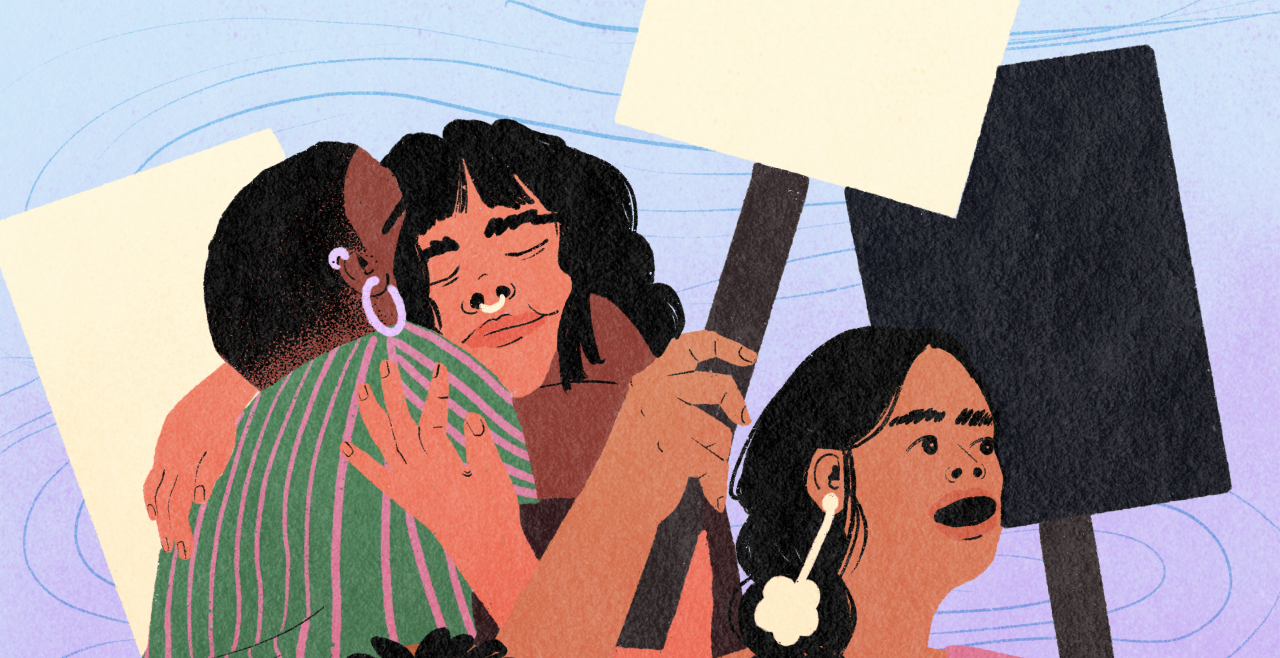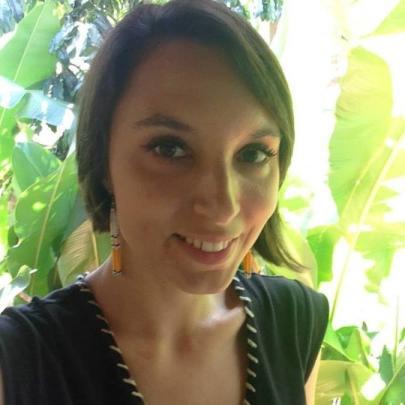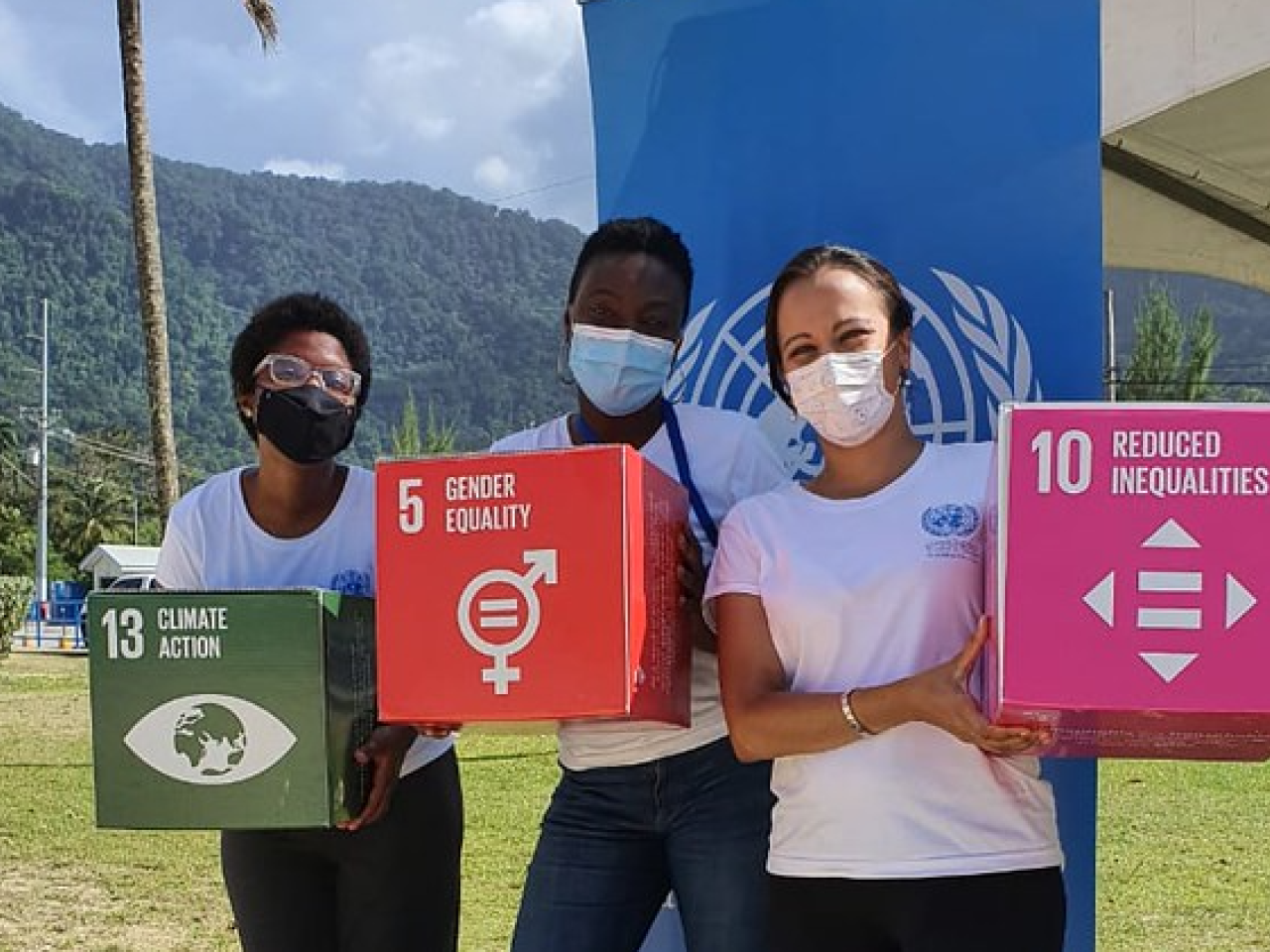Voices from civil society: 'Feminist activists are less and less safe'

NEW YORK, United States - The 68th annual Commission on the Status of Women (CSW68), the UN’s largest annual gathering on gender equality and women’s empowerment, is taking place this month under the priority theme 'Accelerating the achievement of gender equality and the empowerment of all women and girls by addressing poverty and strengthening institutions and financing with a gender perspective'.
Spotlight Initiative invited civil society advocates working on the frontlines of the push to eliminate gender-based violence to share a little about the critical work they do, and to highlight why financing civil society organizations is key to eliminating violence for good.
Nathalie Margi is Senior Advocacy Officer at Urgent Action Fund for Feminist Activism (UAF), where she advocates with partners for better support for feminist activist movements.
What does a regular day look like for you?
Today, at the Commission on the Status of Women, I co-facilitated an event where activists working on gender and disability justice shared recommendations with donors on how they can better fund movements at these intersections. Then, I enjoyed a meal with activist partners from around the world, where Polish and Ukrainian feminists spoke about how they work together to help Ukrainian refugees in Poland access abortions in spite of the ban; Syrian and Yemeni feminists spoke about how they overcome threats while advocating for peace and justice; and sex worker activists shared what they learned from 20+ years of UN advocacy.
On other days, I’m having some of these conversations on Zoom, providing technical guidance to funders on how they can reach more frontline groups, or immersing myself in our latest grantmaking to inform our advocacy strategy.
The organization I work with, Urgent Action Fund for Feminist Activism, provides fast, flexible funding to women, trans, and non-binary activists who take and face enormous risks to challenge oppressive systems and build a more just and equitable world. Our holistic resources enable frontline feminist movements to respond to real-time threats and opportunities, protect and care for themselves and one another, and sustain and propel solutions to the most critical crises and injustices of our time.
“99 per cent of development aid and foundation grants still do not directly reach women’s rights and feminist organizations." - Nathalie Margi, Urgent Action Fund (UAF) for Feminist Activism
Why is financing frontline feminist movements so important?
We simply cannot achieve gender equality without supporting frontline feminist movements. They are the ones generating the transformative solutions we urgently need, despite having been severely under-resourced for generations, all while facing escalating attacks.
When funders commit resources to gender equality, these resources rarely go to or trust the leadership of frontline feminist activists and movements. According to AWID, “99 per cent of development aid and foundation grants still do not directly reach women’s rights and feminist organizations. In particular, those groups working at intersecting forms of marginalization (LGBTIQ, indigenous, young feminists and sex workers) are funded even less.”
Not only do these movements need to be financed, they need to be financed abundantly, flexibly, and sustainably, and donors need to be mindful of the ways in which funding requirements and processes drain vital energy and time away from core movement work.
How has an organization or activist you’ve funded been able to respond to an unexpected risk or opportunity more effectively than a larger organization?
In 2021, threats to reproductive justice and access to abortions were felt across the globe, and Urgent Action Fund supported notable responses to protect those rights in both Poland and Texas.
In January 2021, abortion under nearly all circumstances was banned in Poland. In response, activists took to the streets, leading strikes and protests to challenge the extreme barrier to reproductive justice and the tragic consequences the ban had on people’s lives. Urgent Action Fund awarded a grant to support the strikes and fund feminist abortion rights activists to access psycho-social support to prevent burnout and heal from violent police assaults during the protests.
"Feminist activists are leading urgent, innovative movements for justice, equity, and liberation worldwide. Today, they are less and less safe." - Ms Margi, UAF
On September 1, 2021, Senate Bill 8 (SB8) went into effect in Texas, making it illegal to have an abortion after six weeks. This law does not allow exemptions in circumstances involving rape, sexual abuse, incest or high-risk birth defects. It further criminalizes anyone who performs, assists, aids, or abets abortion. SB8 also allows private citizens to report and get a reward for turning in those who seek abortions. Thanks to our rapid response grants, local organizations conducted advocacy campaigns, increased youth engagement, shifted narratives, coordinated efforts across states to ensure access to safe abortions, challenged the constitutionality of SB8, and educated the public about this law.
Is there anything else you’d like to add?
Feminist activists are leading urgent, innovative movements for justice, equity, and liberation worldwide. Today, they are less and less safe.
Across countries, territories and regions, from standing up to private corporations that push harmful “development” for profit to advocating for LGBTQIA+ rights in their home countries and at the United Nations, feminist activists are facing and taking greater risks for a just world.
Our new campaign and website, "Feminist Activism Without Fear: Facing Risks with Collective Power and Care," showcase the voices of feminist activists from our network advocating for gender justice and working to end gender-based violence. These activists tell the stories of the reprisals they face as a result of their work.
Interview has been edited for length.


